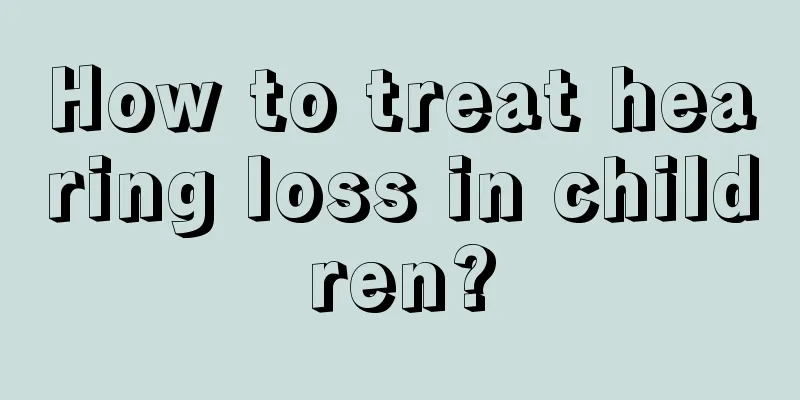How to treat hearing loss in children?

|
If a child has hearing problems, it is possible that he or she has conductive hearing loss, which is a disease caused by ear disease and is actually quite common. In the case of hearing loss in children, it is actually best to take them to a regular hospital for detailed diagnosis and treatment. Parents should avoid using uncertain folk remedies to avoid secondary injury. 1. Syndromic deafness : Common syndromic deafness in clinical practice includes large vestibular aqueduct syndrome, Usher syndrome, Alström syndrome, and Waardenburg syndrome mentioned in the previous case. These children often show a group of clinical manifestations in different organs of the body, including deafness. Taking Waardenburg syndrome as an example, Waardenburg syndrome (WS) is one of the common clinical diseases that cause syndromic deafness. It is inherited in an autosomal dominant manner. At least 2% of congenital deafness is caused by Waardenburg syndrome. The pathogenesis of this disease is a syndrome caused by abnormal neural crest cell function due to the loss of melanocytes originating from the neural crest. The main manifestations of Waardenburg syndrome are sensorineural hearing loss and pigmentary abnormalities, the latter including heterochromia iris, white forehead hair, premature graying of hair, skin hypopigmentation or freckles; other manifestations include ectopic epicanthus, high and wide nasal root, hypertrichosis, straight eyebrows or flushing in the middle of eyebrows. Coping strategies : Most diseases are hereditary, and deafness often manifests as bilateral severe sensorineural hearing loss. Treatment can be achieved by choosing hearing aids or cochlear implants depending on the degree of deafness and achieving certain results. The Auditory Implant Center of the Department of Otolaryngology and Head and Neck Surgery of the General Hospital of the People's Liberation Army has successfully implanted cochlear implants in more than 1,300 patients with severe hearing loss, including a large number of children with syndromic hearing loss, with clear results. Sixteen children with Waardenburg syndrome underwent cochlear implant surgery in our department and achieved good hearing and speech rehabilitation results. Prenatal diagnosis can prevent the birth of some children with syndromic deafness. 2. Drug poisoning : Some studies have shown that ototoxic drugs have become one of the main causes of hearing loss in children. Deafness-causing drugs mainly include aminoglycosides, salicylates, anti-tumor drugs, and alcohol. Common ones include streptomycin, dihydrostreptomycin, neomycin, kanamycin, gentamicin, vancomycin, puromycin, tobramycin, paromomycin, polymyxin B, quinine, aspirin, etc. In addition, some anti-tumor drugs and diuretics can also damage the auditory nerve and cause hearing impairment. Countermeasures : Mothers should avoid taking certain drugs that may damage the fetus' inner ear during pregnancy (especially within 3 months of pregnancy). Such as streptomycin. When ototoxic drugs must be used, close observation is required. Pay special attention to whether there are phenomena such as tinnitus and dizziness. Detect early and take measures early. 3. Deafness caused by the physiological structure of infants' ears : When infants have a cold, are sucking milk in a supine position, or are nauseous or vomiting, they often develop bacterial infection in the middle ear cavity and acute suppurative otitis media. When the pus in the middle ear cavity continues to increase, the child will cry because of the worsening ear pain. The pressure caused by the increased pus in the middle ear cavity can also cause perforation and rupture of the eardrum. If medical treatment is not sought promptly or the treatment is not thorough, it will cause chronic suppurative otitis media, resulting in continuous damage to the eardrum. As the perforation gets bigger, the impact on hearing will become more serious. Coping strategies : Acute otitis media is an acute suppurative inflammation of the middle ear mucosa. After a cold, inflammation of the pharynx and nose spreads to the Eustachian tube, and pathogenic bacteria take advantage of the opportunity to invade the middle ear, causing otitis media. Common pathogens are mainly pneumococcus, Haemophilus influenzae, etc. Therefore, preventing colds can reduce the incidence of otitis media. Blowing your nose incorrectly can also lead to otitis media. Some people often pinch the nostrils on both sides with two fingers when blowing their nose. Blow your nose hard. This method of blowing your nose not only fails to completely blow out the mucus, but is also very dangerous. The snot contains a large number of viruses and bacteria if both nostrils are pinched. The pressure forces the mucus to squeeze out of the posterior nasal opening, where it reaches the Eustachian tube and causes otitis media. The correct way to blow your nose. Press one nostril with your fingers, blow out the mucus from the opposite nostril with a little force, and then blow the other nostril in the same way. |
<<: How to deal with children's ears full of earwax?
>>: Can oily ears indicate body odor?
Recommend
What should you do if your child has a runny nose due to a cold?
The main consideration for babies' runny nose...
How to treat mumps in an 8-year-old child?
Mumps is most common in children. The parotid gla...
How to treat meningitis in children
Meningitis is a particularly serious disease, esp...
What should I do if my baby has green diarrhea?
The baby's every move is what the family care...
The baby always keeps his mouth open
Babies do not have the ability to express themsel...
Baby keeps shivering
Babies are young and often prone to symptoms of i...
Height and weight of one-year-old boy
The physical condition of the child is an issue t...
What are the dangers of precocious puberty in boys?
Precocious puberty means that children under 10 y...
How does a baby's heart beat?
Only when the heart beats normally can we live an...
What harm does fluorescent agent have on babies?
When it comes to fluorescent agents, many people ...
Why do babies always suck their fingers?
A baby is a new life in this world and a fragile ...
Treatment of fever and cough in three-year-old baby
When a three-year-old baby at home has a fever an...
I put my daughter in a kindergarten class with someone I know, but it ruined her
Some parents try their best to choose good kinder...
Three month old baby not feeding at night
If a baby under three months old does not eat at ...
Infants and young children with asthma should pay attention to these
In general, asthma in infants and young children ...









